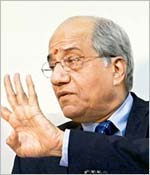|
|
| Help | |
| You are here: Rediff Home » India » Business » Special » Features |
|
 Justice B N Srikrishna. Photograph, courtesy: Business Standard | ||
| ||||||||||||||||||||||||||||||||||||||||||||
|
| ||||||||||||||||||||||||||||||||||||||||||||
No less than 4.5 million government employees will soon have more money in their pockets. And they can thank Justice Bellur Narayanaswamy Srikrishna for it. Still, public records do not have much information on the man.
The official Supreme Court biography does not do justice to Srikrishna. It is a dour summation of the 67-year-old jurist, who by all accounts, is one of the foremost legal luminaries in the country.
A more insightful glimpse can be had from Wikipedia, the free online multilingual encyclopedia written collaboratively by contributors around the world.
Srikrishna, the entry says, is a polymath and polyglot who knows a dozen languages, holds a masters degree in Sanskrit, a diploma in Urdu and a post-graduate degree in Indian aesthetics.
He is also touted as one of the earliest owners of a personal computer in the 1980s and the writer of a computer program. His academic achievements also include an LL.B and LL.M from Government Law College, Mumbai, and the University of Mumbai, respectively.
This specialist in labour and industrial law became a senior advocate of the Bombay High Court in June 1987. He was appointed Chief Justice of the Kerala High Court in 2001, being later elevated to the Supreme Court in 2002, where he served till mid-2006.
Srikrishna rose to national prominence when in the aftermath of the Mumbai riots, he assumed charge of the one-man Commission of Inquiry set up in January 1993. It took five years till 1998 for him to complete the report which indicted those responsible for the bloodshed.
From such a sensitive assignment to heading the Sixth Pay Commission, Srikrishna has handled the new assignment creditably.
Earlier this week, soon after presenting the report to Finance Minister P Chidambaram, he took pride in saying the report had been completed within the stipulated 18 months, with one-third of the staff sanctioned and two-thirds of the budget allowed.
Along with a pay hike, the Pay Commission has recommended some sweeping changes to the central government employee structure. Not only has it said that the stranglehold of the Indian Administrative Service on top administrative positions be broken, but it has also gone ahead and suggested very high salaries for hiring talent from outside the government ranks.
But the report has left many unhappy too. The defence forces complain the hike is not enough, while pensioners say it is riddled with anomalies.
The report has suggested closing down some government bodies, even as it has pointed out the absurdity of the Salt Commissioner's office, which while collecting Rs 3.5 crore (Rs 35 million) on account of the salt cess and ground rent fee, actually incurred nearly three times more (Rs 10 crore or Rs 100 million) expenditure.
While the finer points will be deliberated in the coming days, the last word must obviously go to Srikrishna, who in response to a question told this reporter that "the best judgment is one that makes no one happy."
Powered by
More Specials
|
|
| © 2008 Rediff.com India Limited. All Rights Reserved. Disclaimer | Feedback |